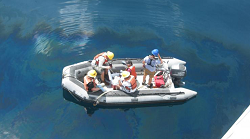Teachers and Students
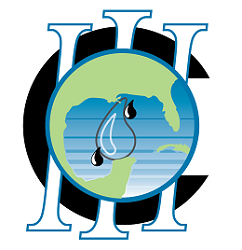
In honor of Teacher Appreciation Week, the consortium highlighted the efforts of Gulf Coast teachers who have accompanied Mud & Blood expeditions, gaining hands-on experience dissecting fish and processing sediment cores. Learn more about the Teacher @ Sea program here. Blogs written by current and previous teachers in the program can be found here on Read More

Dr. Sunshine Van Bael, principal investigator of the RFP-V project Chemical Evolution and Plant-Microbe Degradation of Petroleum in Saline Marsh Plants and Soil, and her colleagues recently hosted a series of workshops in Louisiana for nearly 140 elementary and middle school-aged kids. The workshops were part of Dr. Van Bael’s outreach efforts to teach students Read More

Campers aged 11-14 explored ocean topics such as deep oceans, ecosystems, and chemosynthetic processes through hands-on projects, games, videos, and slideshows. The students also designed and built their own remotely operated vehicles (ROVs) and created stop-motion videos based on the camp’s themes. View the campers’ ROVs. Watch their stop-motion films. See photos from the camp. Read More
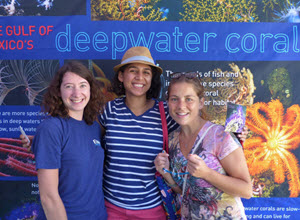
Scientists and education staff have tapped into a novel venue – football games – to reach new audiences and share ongoing research and ocean technology. The research consortium Ecosystem Impacts of Oil and Gas Inputs to the Gulf II (ECOGIG II), funded by the Gulf of Mexico Research Initiative (GoMRI), took their mobile Ocean Discovery Read More

Consortium for Advanced Research on Transport of Hydrocarbon in the Environment (CARTHE) teamed up with Project Give Kids (PGkids) to expose a bright group of foster kids, ranging in age from 1st grade to high school, to the amazing world of marine science. The students started the day with CARTHE outreach manager, Laura Bracken, who Read More

The Dispersion Research on Oil: Physics and Plankton Studies (DROPPS) Consortium had another successful collaboration with the Consortium for Advanced Research on Transport of Hydrocarbon in the Environment (CARTHE) for the UT Summer Science program! We taught 3rd-4th graders about how oil spill scientists sometimes use drift cards to study oil spills to see where Read More

Christia Hewlett was the official Teacher-At-Sea during the consortium’s most recent research cruise. She documented the equipment, experiences, and even the researchers on board for the DEEPEND blog. You can find all of her posts about the cruise here. “I hope that I will be able to take back what I have learned and share Read More

The Alabama Center for Ecological Resilience (ACER) Teacher Advisory Group is a team of local science teachers who will work with the consortium’s Educational Team to increase students’ interest in and understanding of the northern Gulf of Mexico. More Information: http://acer.disl.org/news/2016/02/02/working-with-the-experts/ The goals of ACER’s Education Team include communicating the importance of the northern Gulf of Mexico and Read More
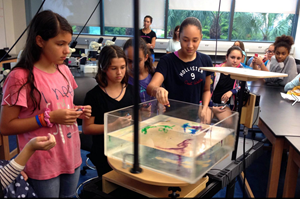
This past Saturday we had the pleasure of participating in the annual Exploring Marine Science Day for 6th-7th grade girls, organized by the University of Miami Rosenstiel School of Marine & Atmospheric Science and the Consortium for Advanced Research on Transport of Hydrocarbon in the Environment (CARTHE). We taught 50 girls from different Miami junior Read More
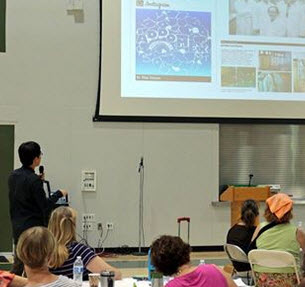
James Chiu presented theAggregation and Degradation of Dispersants and Oil by Microbial Exopolymers (ADDOMEx) Consortium’s research to nearly seventy teachers participating in a program called Team-E Science, which will help them better understand engineering concepts. The program is part of a three-year endeavor to implement engineering curriculum in Merced and Mariposa county schools. Underrepresented minority groups Read More
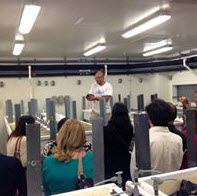
Earlier this month, South Florida teachers attended the Center for the Integrated Modeling and Analysis of the Gulf Ecosystem (CARTHE)-hosted science visualization workshop at the University of Miami, intended to help create improved future resources for sharing science. The workshop featured CARTHE science, NOAA’s global drifter program, RECOVER consortium, University of Miami Rosenstiel School scienitists Read More

Alek stands next to a map of his research area, holding the drift cards he used in his oil spill study in front of a nautical chart of the Salish Sea. (Provided by Alek) Fueled by a passion for science and endangered species, Alek designed and executed a research project that involved scientists from eight Read More
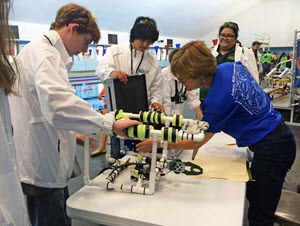
As science, technology, engineering, and math (STEM) skills become increasingly important to the 21st century workforce, what better way to foster those skills in middle and high school students than an old-fashioned friendly competition? Over the past four years, the Deep Sea to Coast Connectivity in the Eastern Gulf of Mexico (Deep-C) consortium and the Read More

A fourth grade class at Singapore American School found Bob the Drifter and the CARTHE science group while researching ocean science and pollution online. CARTHE’s drifter experiments, GLAD and SCOPE, are helping scientists understand how ocean surface currents move pollutants such as oil. CARTHE’s visually-engaging experiments and their animated, data-gathering mascot “Bob” motivated these young students Read More
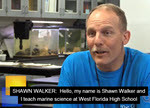
What could be better than having class on the beach and conducting actual research to boot? See how Shawn Walker, a marine science teacher at West Florida High School, transforms his students into scientists. A CPALMS perspective Video.
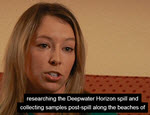
Watch how these high school students work alongside Woods Hole Oceanographic Institution experts conducting oil spill science. A C-PALMS perspective Video by Catherine Carmichael.
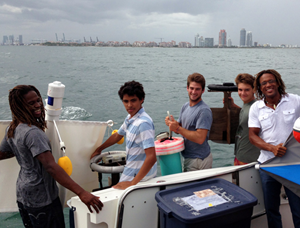
What do the Consortium for Advanced Research on Marine Mammal Health Assessment (CARTHE), the International SeaKeepers Society, and Fleet Miami have in common? Ocean research! Last September, CARTHE researchers from the University of Miami Rosenstiel School partnered with SeaKeepers and Fleet Miami to widen the reach of ocean and oil spill research in the local Read More
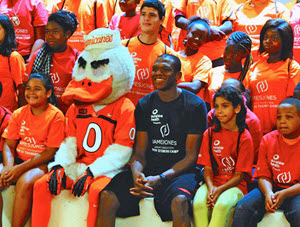
NBA Champion James Jones took the stage for young fans this July, but not to talk about sports. Instead, his goal was to get kids excited about cutting-edge science happening in their home town. Over 40 kids participated in his week-long Crew 22 Training Camp hosted by the University of Miami Rosenstiel School of Marine Read More
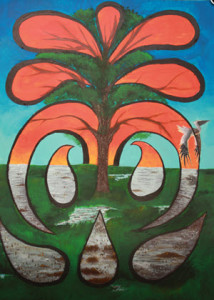
Each summer, parents send their children to camp, trying to match their interests while broadening their horizons. This year, the parents of ten Louisiana students hit the jackpot: the Coastal Waters Consortium (CWC) inaugural Art and Science Camp. This camp challenged participants, engaging both their analytical and creative talents to learn about a locally-relevant and Read More
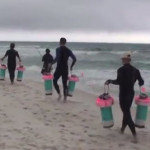
Scientists from the University of Miami have been visiting our area for the last three weeks studying the movements of ocean currents along the coast in order to observe how they carry oil, fish larvae or toxins in the water. On this particular day, 7th grade science students from Episcopal Day School in Pensacola were Read More
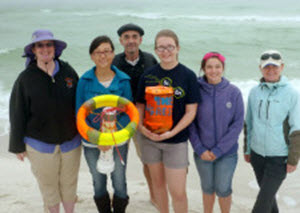
It was a tall order, but high school students rose to the challenge: they integrated physics, engineering, and scientific curiosity and created functional data-gathering drifters. They also became part of a scientific effort to improve predictions of how oil moves through coastal waters and onto shores. In December at Ft. Walton Beach, Florida, scientists deployed Read More
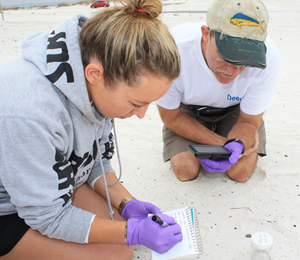
Talk about compounding interest! Put together scientists and teachers who are passionate about their work with students who are eager to help with ongoing research and watch as excitement fuels student engagement, sparks career interest, and feeds enthusiasm of all. And as a side bonus, research is conducted more efficiently in both time and cost. Read More
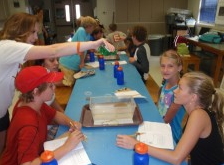
The methods used to remove the oil from the Gulf of Mexico – skimming, soaking, and dispersing – were as much in the news as the Deepwater Horizon incident itself. Three years later, a group of twenty-six middle school students conducted experiments to compare these methods as part of a week-long University of Texas Summer Read More
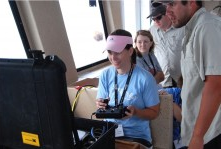
Ten high school teachers from Alabama and Florida are returning to their 2013-2014 science classes armed with new skills, materials, and inspiration. In July, these educators attended a five-day workshop entitled Technology in Marine Science. They built and operated Remotely Operated Vehicles (ROVs) and, more importantly, learned how to use them as teaching tools in Read More

Middle and high school teachers in Florida put on their sea legs, boarded the R/V Weatherbird II, and conducted science that matters to their students and communities. Dr. Teresa Greely (L) assists C-IMAGE Chief Scientist Leslie Schwierzke-Wade (middle) as she talks with 3rd graders at Jamerson Elementary in Florida during a Skype ship-to-shore video conference. Read More
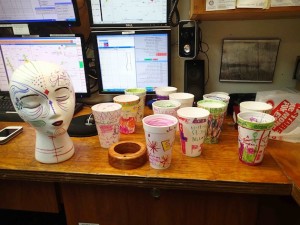
Laura Spencer, a graduate student in Dr. Steven DiMarco’s lab at Texas A&M University, took cups from three classrooms with her on the Gulf Integrated Spill Research Tracer cruise (G03) in the Gulf of Mexico. The cups were lowered in the water on one of the CTD casts. When the CDT was raised, the 5 Read More
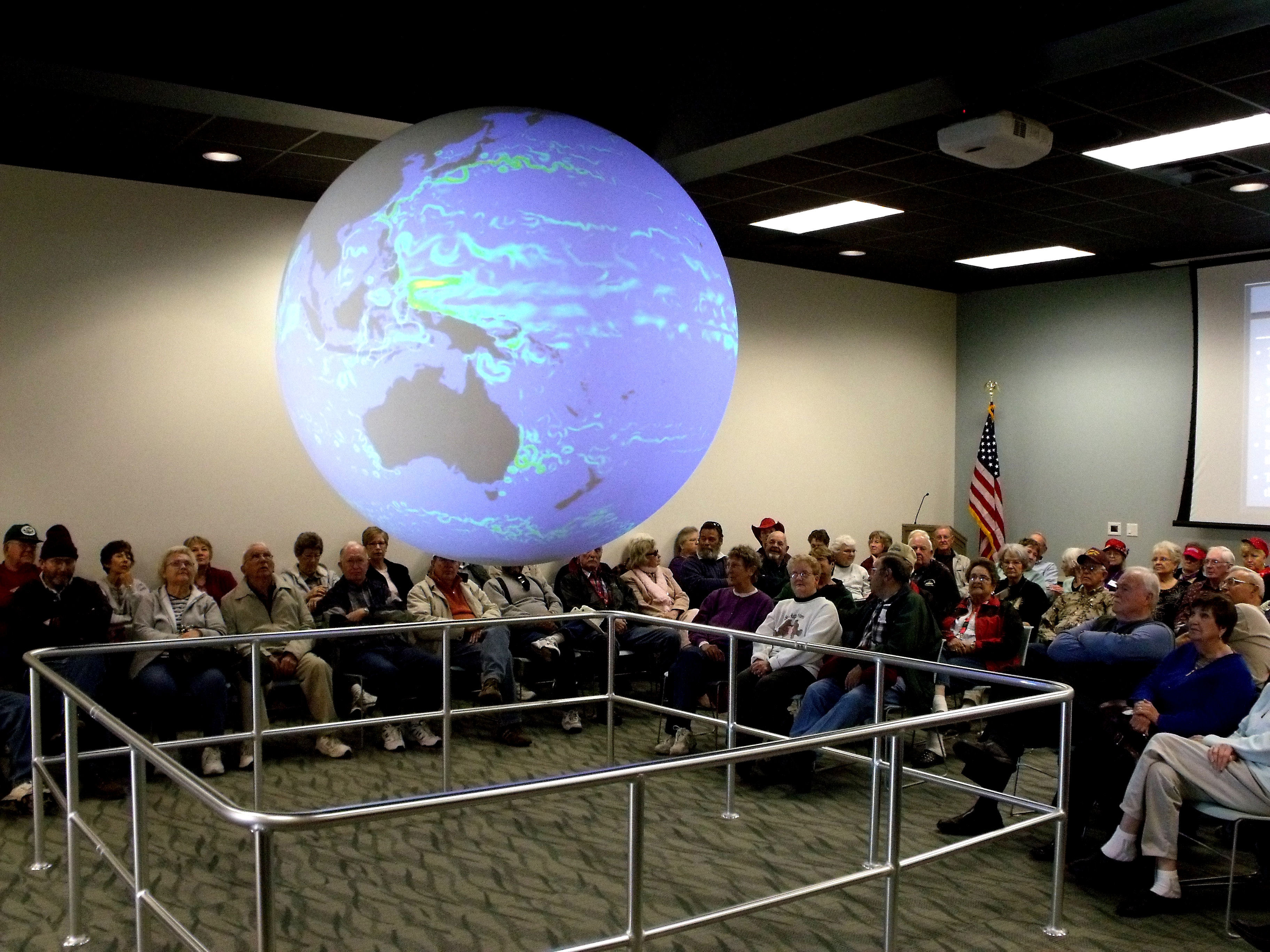
All the world’s a stage – literally – as oceanic, atmospheric, and geologic conditions and events come to life on a “revolving” globe. General public visitors attend a Science on a Sphere presentation at the Bay Education Center. (Photo by Jackie Hattenbach) Researchers and science educators are using visualizations of oil spills, tsunamis, and hurricanes Read More

